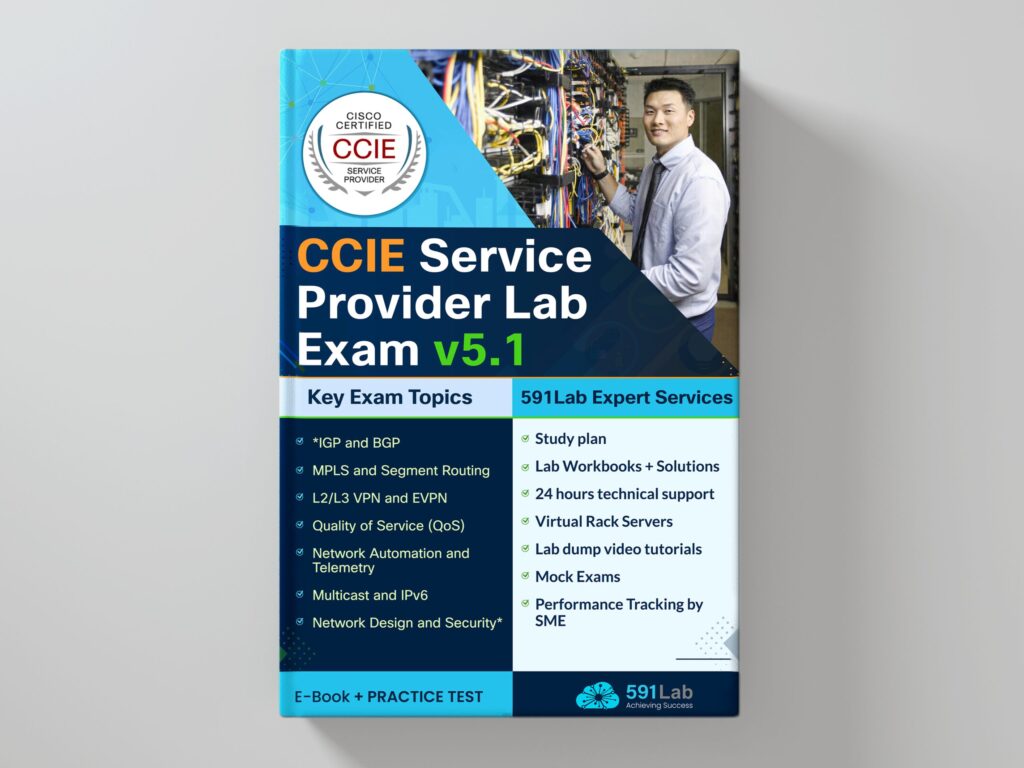Earning the CCIE Service Provider certification from Cisco is a major milestone for any network engineer focused on large-scale, carrier-grade networks. It’s a rigorous certification process that tests deep technical knowledge and practical skills in service provider infrastructure technologies. But to become a CCIE, you must first pass two challenging stages: the CCIE Service Provider Written Exam and the CCIE Service Provider Lab Exam.
Understanding the differences between the two exams—and what to expect from each—can help you prepare smarter and improve your chances of success. In this blog, we’ll break down the structure, focus, and strategies for both exams to help you confidently navigate your CCIE journey.

What Is the CCIE Service Provider Certification?
The Cisco Certified Internetwork Expert (CCIE) Service Provider certification is designed for senior network engineers, architects, and specialists who design, implement, and troubleshoot complex service provider networks. This certification validates your expertise in routing, QoS, multicast, segment routing, MPLS, and automation technologies tailored to service providers.
Stage 1: CCIE Service Provider Written Exam
Overview
- Name: Implementing and Operating Cisco Service Provider Network Core Technologies (SPCOR 350-501)
- Duration: 120 minutes
- Format: Multiple choice, drag-and-drop, and scenario-based questions
- Delivery: Pearson VUE testing center or online proctoring
Topics Covered
- Core architecture and services (IPv4/IPv6)
- Routing protocols (OSPF, IS-IS, BGP, and Segment Routing)
- MPLS and VPN technologies
- QoS mechanisms
- Network automation and programmability (NETCONF, RESTCONF, YANG, etc.)
- Security and monitoring
Purpose
The written exam serves as a qualifying prerequisite for the CCIE lab. It tests your theoretical understanding of technologies used in service provider environments.
What to Expect
- High-level coverage of a wide range of topics
- Scenario-based and analytical questions
- Questions designed to test both your memory and conceptual clarity
- Emphasis on automation and emerging technologies
Study Tips
- Use Cisco Press books and official SPCOR training
- Supplement with INE, CBT Nuggets, or Narbik’s materials
- Take Boson practice exams to test your knowledge in real-time exam scenarios
- Practice Python basics and model-driven programmability
Stage 2: CCIE Service Provider Lab Exam
Overview
- Duration: 8 hours
- Format: Hands-on, practical configuration and troubleshooting
- Location: Cisco testing centers worldwide
Structure
The lab is divided into two sections:
- Design Section (3 hours): You’ll be given a set of requirements and asked to design a solution based on network and business needs.
- Deploy and Operate Section (5 hours): This part focuses on hands-on configuration, validation, troubleshooting, and automation tasks on live equipment or virtual labs.
Technologies Tested
- BGP, MPLS L3VPN and L2VPN
- Segment Routing and IS-IS/OSPF
- QoS and Traffic Engineering
- Multicast, EVPN
- Automation using tools like Python, Ansible, NETCONF/YANG
What to Expect
- Realistic, production-like scenarios
- No partial credit: configurations must work as intended
- Strict time management is crucial
- Deep familiarity with CLI and debugging tools is required
Study Tips
- Build or rent a practice lab with routers (CSR1000v, XRv9K)
- Use EVE-NG or GNS3 for emulation
- Practice with Cisco’s Lab Workbook or INE’s lab topology
- Join study groups and share troubleshooting techniques
- Automate common configs using Python/Ansible to save time during the exam
Key Differences: Written vs Lab
| Feature | Written Exam | Lab Exam |
|---|---|---|
| Format | Multiple choice | Hands-on configuration + design |
| Duration | 2 hours | 8 hours |
| Location | Online or test center | Cisco CCIE lab locations |
| Focus | Theoretical knowledge | Practical skills, real-time problem-solving |
| Prerequisite | Qualifies you for lab | Final step to earning CCIE |
| Complexity | Broad and conceptual | Deep and task-driven |
Final Thoughts
The journey to becoming a CCIE Service Provider is challenging but rewarding. The written exam ensures you understand the theory behind the technology, while the lab exam pushes you to apply that knowledge in complex, high-pressure scenarios.
Preparation for both exams requires time, discipline, and a mix of quality study materials and hands-on practice. By understanding what to expect at each stage, you can approach your CCIE certification with confidence and a clear plan for success.
Start early, study smart, and stay consistent—your CCIE number is within reach.
